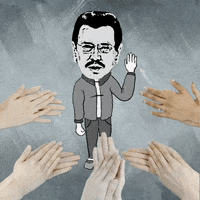Does an elective post after a presidential term tarnish or burnish the legacy of a chief executive?
Why is President Rodrigo Duterte, who has long stated that he wants to retire from politics, running for a senate seat? Why do some presidents continue to run for public office after their term as the country's highest government official?
On Nov. 15, on the deadline set by the Commission on Elections for candidate withdrawals and substitutions, Duterte officially entered the senatorial race. In opting to run as senator, Duterte ditched his much-publicized plan to run as vice president, where he would have faced off with his very own daughter Davao City Mayor Sara Duterte-Carpio.
On Nov. 18, Duterte said he is running as senator to change how senate inquiries are done, as he repeated his recurrent tirade against Senator Richard Gordon and the way he has been handling hearings in the chamber.
But political analysts see his post-presidential run as a stab in seeking cover against possible charges, and a potential platform for subsequent political aspirations.
“A position in the Senate would provide Duterte an extra layer of protection against possible lawsuits, charges that might lead him to prison—like the drug war,” Stratbase managing director Dindo Manhit told PhilSTAR L!fe. “We don’t expect Duterte to perform in the Senate because he’s never been known to be very active when he was a member of Congress for Davao City in the 1990s. Now, at his age, I don’t see him being very active there but it’s an easier place for him to make a comeback than to be a vice president.”
Jean Encinas-Franco, an Associate Professor at the University of the Philippines Department of Political Science said that Duterte, should he be elected as a senator, will have to reckon with a different political environment as he will be “just one among many.”
“He might probably not be used to a political pace in which deliberations are important because it’s very difficult when you’re a mayor and you’re a president. You make decisions, people consult you, and then you make a decision,” she explained. “In the Senate, you’re one among many so it’s always a collective decision. To prove your point, you have to deliberate and convince others so that may not be within his experience throughout these years.”

This has been done by other former presidents, but for other elective posts. After being impeached as the country's 13th president in 2001 due to plunder charges, Joseph “Erap” Estrada triumphed in his bid for Manila mayor from 2013 to 2019. “He still has his resources, he is known nationwide when he ran for the city of Manila and he still used ‘Erap Para sa Mahirap’—his mantra. For some people, it must have resonated,” said Franco.

Estrada, however, then lost to Mayor Isko Moreno Domagoso in the 2019 elections.
After Estrada’s stint as president, Gloria Macapagal-Arroyo took over his seat from 2001 to 2010. Her presidential term was also tainted with corruption charges, foremost of which is the NBN-ZTE deal, and allegations of rigging the elections, brought by the "Hello, Garci" controversy. Arroyo was detained for plunder in 2011 but was acquitted by the Supreme Court in 2016, citing insufficiency of evidence.
After being president, Arroyo served as Pampanga's 2nd District Representative from 2010 to 2019, eventually vaulting to become the first female House Speaker in 2018, replacing then Rep. Pantaleon Alvarez in the post.

She stepped down from the post a year later and announced her retirement from public service. At the time, she told the media that “We all have to move on.”
But for the May 2022 polls, Arroyo came out of her retirement to again run as the congressional representative of the second district of Pampanga.
Political analysts said that presidents continuing to run for public office shows their desire to remain relevant.
“The fact that they have been reelected again tells us that they still want to have power, that they still want to vindicate themselves," said Franco.
For Manhit, it’s also “about gaining power, political power, political influence.”
“It’s quite sad that I think the spirit of our institution was meant that presidents are simply meant to do their best and achieve what can be achieved in that six years. Why run for a lower position?” said Manhit. “I believe anyone who respects institutions, who respects the spirit of the system of government, should not be doing it.”
Franco said that the presidency is supposed to be the apex of power and the highlight of their career. “Once you’ve had it, parang it’s time to retire and do something else that may still be within the ambit of public service, but no longer as powerful as being in certain political positions.”
